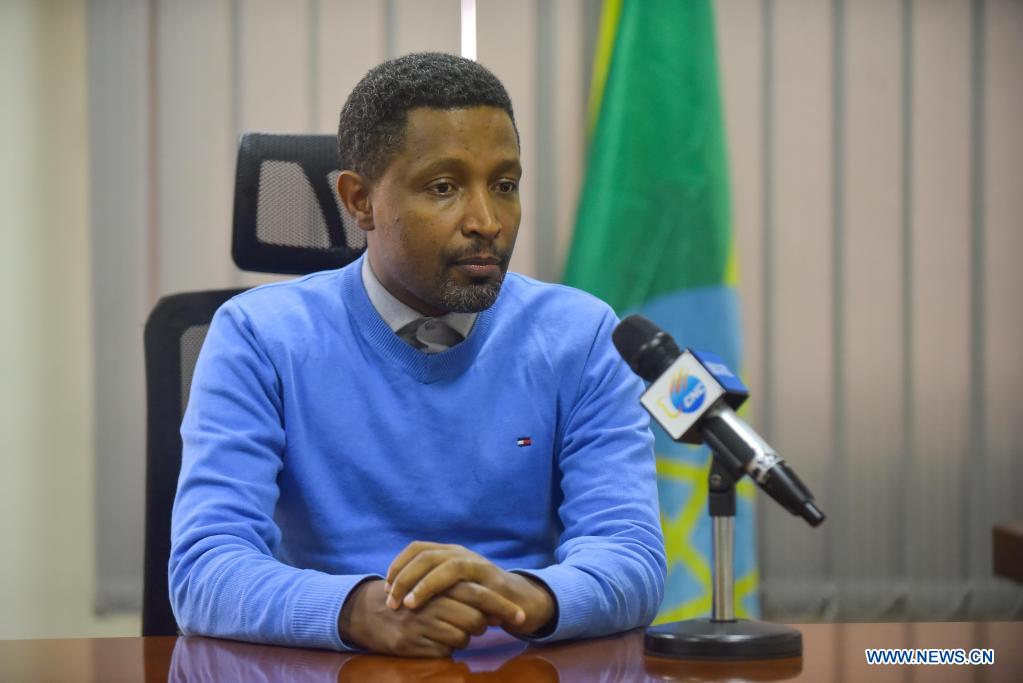
Yaregal Bante, director general of the National Blood Bank Service, speaks during an interview with Xinhua in Addis Ababa, Ethiopia, on July 16, 2021. (Photo by Michael Tewelde/Xinhua)
ADDIS ABABA, Aug. 16 (Xinhua) -- Asegash Gossa, 56, is one of the few regular voluntary blood donors in Ethiopia, where the practice of blood donation has demonstrated steady progress.
Gossa has donated blood a staggering number of 81 times, each time she donated 450 ml and is regarded as a "hero" at the Ethiopian National Blood Bank Service where she works as a nurse and communication officer.
Gossa's regular voluntary blood donation started in 1992 when she was approached by a disheartened man who wanted to donate blood to his wife who suffered from postpartum hemorrhage.
"It was a heartbreaking moment when the man said his wife was nearing to die due to bleeding after giving a birth at Black Lion Hospital in Addis Ababa," said Gossa, who donated blood on the man's behalf and has since then become a regular donor.
The World Health Organization (WHO) recommends that 1 percent of a country's population should donate blood to meet the national demand. Accordingly, about 1.1 million Ethiopians are expected to be regular blood donors, said Yaregal Bante, director general of the National Blood Bank Service in a recent interview with Xinhua.
In Ethiopia, blood donation service began in 1969 by an Israeli doctor along with members of the Ethiopian Red Cross Society.
Prior to 2011, the blood bank had used a 'replacement donor' system whereby a family member of a recipient donates blood in exchange of the same volume of blood in the bank. After 2011, the bank has been collecting blood on a voluntary basis and managed to get 288,000 donors on average every year, each donating 350 ml to 450 ml of blood, Bante said.
According to Bante, the bank distributes the collected blood to 80 state-run and 17 privately-run hospitals through its 43 branches across the country.
Matias Tesfaye, 11, is one of the thousands of regular blood recipients in the Black Lion Hospital, Ethiopia's main referral hospital, where up to 80 percent of the national blood transfusion exercise takes place.
Tesfaye, who suffers from Aplastic anemia, a rare disorder in which the bone marrow fails to produce enough blood cells, receives blood every three days.
"My son would have not been saved, had it not been for the blood transfusion treatment in the hospital," said Meseret Fituma, Tesfaye's mother who spoke to Xinhua recently.
"Tesfaye needs to undergo bone marrow transplantation every three days to help him stay alive," said Beweketu Getnet, a coordinator in the Hospital's Specialized Cancer Center Laboratory.
According to the coordinator, Tesfaye has received a total of 60 units of red blood cells and 1,000 units of platelets; each unit has a volume of 50 ml since he was admitted in June 2018.
"It is like an expensive medicine," said Fituma, who wished long and healthy lives to all voluntary blood donors.
The donated blood is saving lives of thousands of patients who suffer from different types of cancers and car accidents among others, said Getnet, the coordinator.
Contrary to WHO's estimation, the majority of the donated blood in Ethiopia is used by mothers who suffer from postpartum hemorrhage, according to Yaregal Bante, the director general of the National Blood Bank Service.
"In a country like ours, 54 percent of the donated blood is used by recipients ranging from 15 to 44 years old. 71 percent of them are women," Bante said. "We supply blood to patients who are in critical condition, to victims who are bleeding due to accidents; to mothers suffering from bleeding after giving birth and newborn babies requiring blood transfusion."
Even if the bank falls short of meeting WHO's recommendation, it has managed to achieve the country's demand for blood transfusion purposes, Bante said.
Women seem more willing to donate blood than men despite the limitations that affect their donation rate due to delivery and breastfeeding.
Things are changing. Nurselam Shiferaw is another volunteer who spoke to Xinhua as a beginner blood donor in the National Blood Bank Service in Addis Ababa, the capital of Ethiopia. He said he was donating blood to help those patients who suffered from injury amid ongoing conflict in the northern part of the country.
"If you go to hospitals, you see many people dying from lack of blood. The number of people who are victims of traffic, manmade and natural accidents is increasing. Hence, I consider donating blood to the needy is not a big deal," Shiferaw said. Enditem